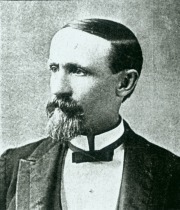| Letter Index | 16th OVI Home Page | McClure Letter #2 |
Camp Cumberland Ford, Kentucky - April 25, 1862
to the Wooster Republican newspaper
Published May 8, 1862
The following is a transcription of a letter believed to have been written by Capt. Addison S. McClure, Company H, to the Wooster Republican newspaper. The determination of the author is made by the signature
A.S.M.and that subsequent letters signed similarly include the newspaper heading
From Capt. McClure's Company. The transcription was kindly provided by website contributor John M. Pierson. Spelling and grammatical corrections were not made.
This letter was written while the 16th Ohio was camped near Cumberland Ford, Kentucky, about 15 miles north of Confederate held Cumberland Gap. Capt. McClure describes the new military organization in which the 16th Ohio now resides. He goes on to provide his opinions on the Battle of Pittsburg Landing (Shiloh, Tennessee), chastising certain writings by journalists or others who, apparently, had criticized the actions of the Union generals. McClure concludes with a brief mention of the approaching advance on Cumberland Gap.
From the 16th Regiment.
Camp Cumberland, Ky.,
April 25, 1862.
Mr. Editor: — This portion of the army is being reconstructed and enlarged. It is now denominated the 7th Division, and commanded by Brig. Gen. Morgan. Four brigades constitute it: The 24th, commanded by Brig. Gen. Carter; the 25th, by Brig. Gen. Spears; the 26th, by Col. de Courcy; and the 27th, by Col. Colburn.
Of our preparation of artillery, and our exact forces of infantry and cavalry, I do not deem it advisable to communicate intelligence. I have adopted this reservation, not because I considered the publication of our forces in our far-off county paper would be of advantage to the enemy, but from a desire to obey the injunction against publishing information of the preparation and movements of the Federal army. I can, however, safely affirm that, with the approaching accessions to our forces, we will be abundantly able to expel the Confederate troops from Cumberland Gap, thus emancipating East Tennessee from the dominion of mob law and revolutionary authority. Deficiency of numbers has long compelled us to inactivity. Other divisions of the army have, by noble exploits performed and perils passed, drawn to themselves the eyes and praise of the nation.
The battle of Pittsburg Landing, though bloody and destructive, cannot properly be challenged as a great victory. The annihilation of that division of our army would have retrograded the composition of our Federal difficulties a half of a year. It should be a thing of exultation to all loyal men that that calamity was averted by the bravery, heroism and unyielding opposition of our troops.
I have read some elaborate efforts to disparage the conduct of Ohio troops on that occasion. A herd of goose-quill popinjays and out-of-shell-reach squirts, ensconced behind big circumferenced trees, on some far-distant height, telescope in hand, viewing the battle, propagated these defamations. This ink-bottle division, this steel-pen nobility, with self-extolled heroism, seek to decapitate Generals, to disgrace regiments, and to indicate movements that would conduct armies triumphantly thro' their enemies. Undoubtedly these type-scavengers could charge on a flock of sheep or stab a wine-bag; but to mutilate the record of a State for bravery, they are copiously inadequate.
That the affair at Pittsburg Landing was mismanaged is as indubitable as that the bravery of our soldiers alone rescued us from calamity. Incompetent generalship should never reflect discredit on soldiers.
Hence forth Confederate resistance to Federal arms must assume one of two aspects. It must be fragmentary or collected. If they oppose us by detachments, disseminated over a vast extent of territory, their subversion will be the more certain. If they oppose us by a general collection in some one of the Gulf States, their subversion will be the more overwhelming. The former would delay, the latter accelerate the conclusion of this unnatural struggle. The former would be the more dangerous to the Confederate, the latter would be the more dangerous to the Federal Government. Concentration is the safety of numerical inferiority, dispersion its destruction. The principle is exemplified in the brightest victories of the greatest Generals.
Of our last expedition to Cumberland Gap you are sufficiently advised. Popular estimation of the inaccessibility of that stronghold is considerably modified. The Confederate gunnery was bad. Of the 300 shells discharged, not one did execution. The rebel artillery though of heavy calibre is smooth-bore and consequently of short range and inaccurate aim. Our Parrott guns dispatched shell into all parts of their works with ease and safety. You may expect stirring news from the division of the army ere long.
We may have a bloody fight: we may have an easy victory. It is not the strength of stone walls or of embankments in mountain passes that empower a foe. It is the holiness of cause nerving the arm, fortifying the spirit, absorbing individual peril in the peril of the espoused side.
I am glad to hear that Wayne county was represented in the great fight at Pittsburg Landing. Some of her sons are dead, some are wounded, some are captives. Many more may be added to the record of the dead and defaced before this foul-born, slave-defending insurrection is overcome.
Yours, &c., A.S.M.
| Letter Index | 16th OVI Home Page | McClure Letter #2 |
